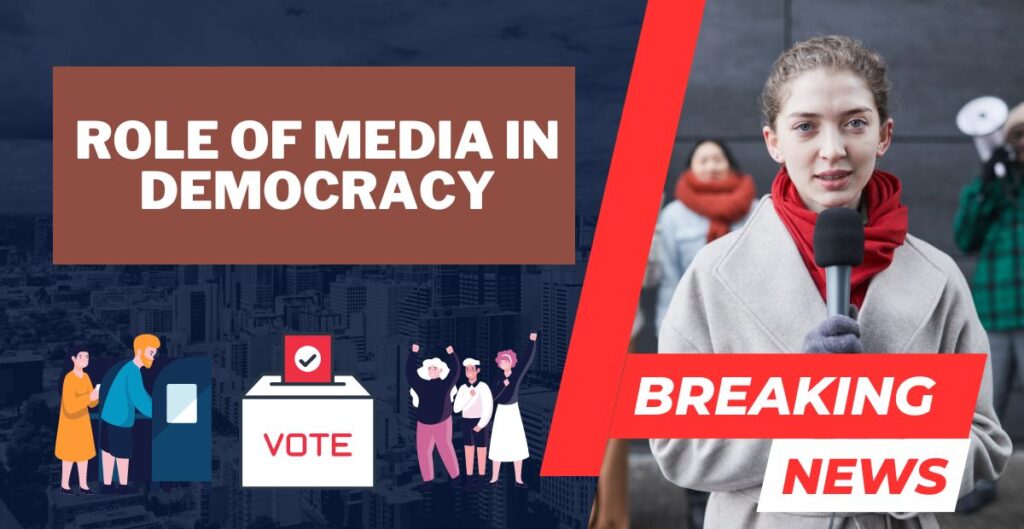Media is called the fourth pillar of democracy. The other three pillars are the legislature, the executive, and the judiciary. Media is the fourth pillar through which the government is able to reach its message to the people, again people’s complaints or messages to the government.
So the media must be transparent. If not, democracy will be endangered. In this article, I will analyze for you what role media plays in maintaining a democratic environment and what are the challenges in their work, and what should be done to get rid of those challenges.
Role of Media in Democracy

By disseminating information, fostering public dialogue, holding authority figures responsible, and promoting transparency, the media is essential to democracy.
Free and independent media are crucial for the operation and development of the system in democracies. This article explores the significant role of media in democracy such as informing citizens, promoting political participation, and safeguarding democratic principles.
Here are the 6 key points that cover the essential role of media in democracy.
- Informing Citizens
- Media as Watchdog
- Promoting Political Participation
- Providing a Platform for Diverse Voices
- Educating Citizens
- Fostering Public Discourse
1. Informing Citizens
the role of media in democracy is to inform the public about current affairs, governmental initiatives, and other matters that have an impact on society.
The public and the government are connected through the media. It provides a field for the dissemination of information. Citizens can access diverse perspectives through newspapers, television, radio, and online platforms. News articles, and their analyses, enable them to make informed decisions.
2. Media as a Watchdog
As a watchdog, independent media monitor the actions of government institutions, politicians, and public officials. news media exposes corruption, malpractices, and abuse of power. it may be considered as the most important role of media in democracy.
Investigative journalism is crucial in creating openness and holding influential people and organizations accountable. By bringing such issues to light, the media helps in maintaining the integrity of democratic systems and fostering public trust.
3. Promoting Political Participation
promoting political participation is another key role of media in democracy. Media plays a vital role in promoting political participation among citizens. By covering elections, political campaigns, and debates, the media informs the public about the available choices and helps to shape public opinion.
Individuals who have access to information are more empowered and informed individuals actively participate in politics to make decisions and hold elected officials responsible for their actions. Media platforms also serve as forums for public discussions, allowing citizens to express their views and concerns, and fostering an inclusive democracy.
4. Providing a Platform for Diverse Voices
The sharing of ideas and the involvement of various voices are essential components of a thriving democracy. Whatever their background or socioeconomic class, media provides a platform for individuals and groups to communicate their beliefs and views. this fosters the role of media in democracy.
It gives a voice to marginalized communities to enable them by highlighting their issues and advocating for change. Media diversity ensures a plurality of viewpoints and promotes a vibrant democratic culture.
5. Educating Citizens
Media serves as an effective educational tool. It helps citizens to understand complex issues and policies. It explains the functioning of government institutions, the role of different branches of power, and the impact of decisions on society.
The media contributes to citizens becoming more civically educated by providing in-depth reporting and analysis that improves their comprehension of democratic procedures and their capacity for effective participation.
6. Fostering Public Discourse
The public debate and the interchange of ideas are facilitated by media channels both traditional and digital platforms. Opinion pieces, debates, and talk shows encourage the exploration of various viewpoints, leading to a better understanding of diverse perspectives.
Strong public discourse promotes democratic principles including tolerance, respect for opposing viewpoints, and the capacity for productive debate. Media serves as a catalyst for this discourse, helping societies to navigate complex societal issues and find common ground.
Challenges and Responsibilities of Media
The media in a democratic society faces numerous challenges and carries significant responsibilities. These challenges and responsibilities are crucial to address in order to uphold the integrity and effectiveness of the media in serving democratic principles. Here are some key challenges faced by the media in a democracy:
Challenges Faced by the Media in Democracy
- Fake News and Misinformation: The growth of false information and fake news is a serious setback to the media. Rapidly disseminating false or misleading information has the potential to degrade democratic processes. It undermines public trust and sways public opinion also. Media organizations face the challenge of verifying information and ensuring accuracy before reporting.
- Political Interference: Politicians or powerful interest groups may attempt to influence or control media content to serve their own agendas. Media independence and objectivity can be compromised by political intervention. It limits the media’s ability to serve as a watchdog and hold transparency. Media organizations need to resist undue influence and maintain their independence.
- Economic Pressures: Media organizations often face economic pressures due to declining advertising revenues and competition from digital platforms. These pressures can lead to cost-cutting measures, compromising the quality and depth of reporting. Sustainable business models need to be developed to ensure the viability of independent journalism.
- Lack of Media Diversity: Media concentration and lack of diversity in ownership and perspectives can limit the range of voices and viewpoints represented in the media. To ensure diverse viewpoints and to accurately reflect the interests and concerns of all societal groups, it is crucial to support media diversity.
- Threats to Journalists’ Safety: Journalists often face physical threats, intimidation, and harassment when reporting on sensitive issues or exposing corruption. to maintain free and independent media, it is required to make sure that journalists are secure and protected.
Responsibilities of Media in Democratic Society
- Accuracy and Truthfulness: It is the primary duty of the media to provide accurate and reliable information to the public. Fact-checking, verification of sources, and rigorous reporting standards are essential to maintain credibility and counter the spread of misinformation.
- Ethical Reporting: Upholding ethical standards is vital for the media in a democracy. Fairness, impartiality, and transparency in reporting ensure that diverse perspectives are represented and that the public receives unbiased information. Media organizations must adhere to codes of ethics and professional standards.
- Holding Power Accountable: The media is essential in ensuring that elected officials, public servants, and government agencies perform transparently and responsibly. Investigative reporting, exposing power abuses, and covering up corruption are crucial media duties in defending democratic ideals.
- Public Interest Reporting: Media houses have a duty to report on topics of public interest, such as social justice, human rights, environmental issues, and other significant subjects. By bringing attention to these issues, the media contributes to informed public discourse and helps address societal challenges.
- Promoting Civic Engagement: Media should actively encourage citizen participation in democratic processes. By providing platforms for public debates, hosting discussions, and facilitating public discourse, the media fosters civic engagement and promotes an informed and active citizenry.
- Diverse Representation: Media organizations should strive for diversity in their newsrooms and ensure representation from different backgrounds, cultures, and perspectives. This helps to overcome biases and provides a broader range of viewpoints, fostering inclusivity in democratic societies.
- Media Literacy: The media promote media literacy among the public. Educating citizens on how to critically analyze information, discern credible sources, and navigate the media landscape helps empower individuals to be active and informed participants in the democratic process.
Conclusion
In conclusion on the role of media in democracy, it can be claimed that free and independent media is essential to a democracy. Its role in informing citizens, holding power accountable, promoting political participation, and facilitating public discourse is essential for the functioning of democratic systems.
By providing diverse perspectives, empowering citizens, and ensuring transparency, media contributes to the development and progress of democratic societies. However, preserving the integrity of media and upholding democratic values require ongoing efforts from both media organizations and the citizens they serve.
Let me share with you what you have learned from “The Essential Role of Media in Democracy“.
Must Read Guide-

